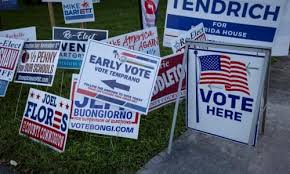Los Angeles Voters Head to Polls Amid High Stakes Elections
Polling stations across Los Angeles opened early this morning as voters participate in pivotal elections expected to shape the city’s future for years to come. The ballot includes decisions on critical local races, encompassing city council seats, the District Attorney’s office, and several propositions aimed at governance reform and public safety. Each of these elections could affect a variety of issues, from housing to law enforcement, and they are being closely monitored by both residents and analysts alike.
Key Races and Issues on the Ballot
Among the most closely watched contests is the race for Los Angeles District Attorney. Incumbent George Gascón faces multiple challengers who represent varying perspectives on criminal justice policies. This race has emerged as a battleground for discussions around public safety, where candidates have differing viewpoints on issues such as sentencing guidelines, prosecution policies, and police-community relations. Residents are particularly focused on how these policies could impact crime rates and community wellbeing.
Civic Engagement and Voter Turnout
This election cycle has witnessed heightened civic engagement, with early voting and mail-in ballots already showing record levels of participation. Long lines were reported at several polling locations during the morning rush, raising concerns about wait times and voter accessibility. However, election officials have assured residents that additional staff and extended hours will help manage the overwhelming turnout, making it easier for voters to cast their ballots.
Local Governance and Propositions
In addition to the high-profile races, voters are also considering essential propositions that could significantly alter local governance. One such measure is Measure A, which proposes a 0.5% sales tax increase aimed specifically at funding services for homelessness. With Los Angeles grappling with a persistent homelessness crisis, this measure has garnered substantial attention and debate among residents who are keen on finding effective solutions.
Another important proposition, Measure G, seeks to expand the city council and create an independent ethics commission to oversee campaign finance regulations. Advocates argue that increased oversight could lead to greater transparency and accountability in local governance, while critics raise concerns about potential bureaucratic inefficiencies. The outcomes of these propositions could set critical precedents for how Los Angeles governs itself in the future.
Political Analysts Weigh In
As polls close at 8 p.m., the anticipation around the results continues to build. Political analysts predict that the outcomes of these elections could have significant implications for the city’s policy direction. From housing to policing, the voters’ decisions today will directly influence how issues are tackled in the years to come. Close races may take additional days to finalize, and the manner in which the results unfold will set a tone for Los Angeles’ political landscape and governance approach moving forward.
Conclusion
The elections in Los Angeles are more than just a routine exercise; they represent an opportunity for residents to voice their concerns and shape the future of their city. Critical issues such as crime, housing, and governance reform are at the forefront of this election cycle. With high voter engagement and significant propositions on the ballot, today’s elections will likely resonate for years, influencing public policy, community safety, and economic decisions. As results start to come in, all eyes will be on Los Angeles, awaiting the verdict of its voters.
FAQs
What are the main issues in the current Los Angeles elections?
The main issues include criminal justice policies, homelessness, affordable housing, police funding, and governance reform, reflected in various city council races and propositions.
How do the propositions on the ballot impact Los Angeles?
Propositions like Measure A and Measure G aim to address homelessness through increased funding and enhance transparency in local governance, respectively, which could significantly shape future policies.
What should voters expect in terms of wait times at polling locations?
While long lines were reported during the morning rush, election officials have implemented measures such as additional staffing and extended hours to manage the crowd more effectively.
When can voters expect to see results?
Polls close at 8 p.m., and results are expected to start coming in late tonight, though some particularly close races may take days to finalize.
Why is voter engagement high this election cycle?
Increased civic engagement can be attributed to the critical nature of the issues at stake and the heightened awareness of local governance, prompting more residents to participate in the electoral process.

